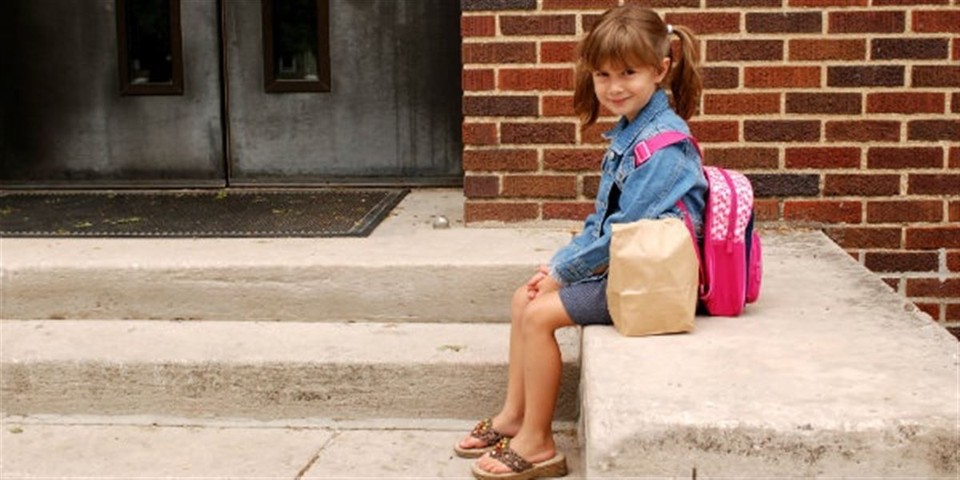How to Know When Your Child's School is Not Right

School is underway, and you’re concerned about your son or daughter. Perhaps you’re seeing failing grades, anxiety over the workload, or spiraling self-esteem. Although kids will feel a full-range of emotions during their school-age years, if your child’s personality and confidence about school teeter toward the worrisome or dangerous, take a closer look into the situation and determine whether or not your child’s school is a good fit.
I have been in this spot several times, which always prompted us to advocate for change within our child’s school or look for better options. I know the nights of sleep you’re losing over this decision, the prayers, and the school visits. Don’t despair—here are a few things to help you narrow your criterion.
Photo Credit: Thinkstock

Is school the problem?
Truthfully, you may or may not need to change your child’s school. As a teacher and a parent, I’ve researched and experienced firsthand the weighty pros and cons of pulling a child from one school to try another. Here are some things to consider as you determine if your child’s school is a bad fit.
Photo credit: ©Thinkstock/Weedezign

Atmosphere.
School is critical to a student’s development as a person, as well as a learner. Not only is the educational component important, but school provides kids a place to socialize and problem-solve with their peers. It’s where they learn to cave or stand up for values, choices, and injustice. At school, kids compare their beliefs, traditions, and family dynamic to other kids’ families; they make conclusions about their values, relationships, self-worth, and image of success.
An ideal school situation is one that affirms your family values and culture. However, a school that opposes your family values and culture might still not be the wrong choice; you and your child will just need to approach it from a missional, intention perspective, which is actually a Biblical way to live (Matthew 5:13-16).
Photo credit: Unsplash

Don't jump to conclusions.
A parent’s natural conclusion to an unhappy or unsuccessful student is to find fault with the child, the school, the curriculum, the teachers, or any combination. This is hasty and unwise, and it can often lead to premature decisions about changing schools or imposing punishments. Take each possible factor and ask some important questions. When your child’s behavior and/or personality traits cause concern, stop and ask:
Photo credit: ©Thinkstock

What does your child love?
Is he/she getting that at school? (artistic, conversation, teacher attention, friendships, active learning, etc.)—if none of the things children love to happen during their school day, they are going to be unhappy, angry, or discouraged about school. While we try to help our kids improve in areas that aren’t natural for them, kids must also spend time growing in the areas where they are gifted. Many high schools have honed this aspect of education by providing specialty centers, but as with many specialty requirements, a student’s GPA or teacher recommendations could interfere with gifted students getting in to programs they would actually excel in.
Photo credit: ©Thinkstock/KatyMcDonnell

What upsets them?
Nobody likes to fail at something; however, a child who is upset by teachers, grades, or friendships has other issues that should be addressed. Prolonged anger, resentment, worry, fear, and depression point to social issues like bullying, marginalization, betrayal, abuse, or low self-esteem. When these symptoms manifest themselves, seek professional counseling and hold off on making big decisions about your son or daughter’s future.
Photo credit: @Thinkstockgpointstudio

Who do they talk about?
Do they speak positively about other students and friends? Do they lack respect for teachers and administrators? Are the classes too easy or too hard? Your student’s perspective about his/her school will tell you a lot about how they fit in at school.
Photo credit: ©Thinkstock/monkeybusinessimages

In what areas are they improving or succeeding, and how easy is it to develop?
Combined with the previous questions, this question will help you determine if your child’s struggles are scholastic, personal, or both. If your child has always loved math, but now hates math, is doing poorly, or complains about the teacher, you can surmise that he or she has had a miscommunication or personality conflict with the math teacher, which is affecting his/her listening and learning. In the areas of success, determine if they are doing well because the teacher likes them/doesn’t want to grade them down or because they actually have mastered the material. As a tutor, I see large numbers of students who have scored well in school yet lack basic skills. Eventually, a poor grasp of material catches up to students, and they begin failing in subjects they believed they understood. Make sure your student is getting teacher feedback on problems and papers; better yet, read his/her work—is it good, terrible, or overlooked?
Photo credit: ©Thinkstock/Ridofranz

Life preparation.
Your child’s educational experience is life preparation. You must weigh good and bad influences with your child’s need to grow through hardship and success. Assess the school environment, academic focus (is the focus test scores or learning-based?), classroom size, teaching styles, interaction with students, strength of arts and sciences, variety of extra-curriculars and field trips, demographics, and overall sense of school identity.
Does the school feel like a family? Are teachers and staff interested in assisting your family, or do they expect you to conform to theirs? This will indicate the approach they will take with your child (Romans 12:1-2). Teachers who speak encouragement and support into your child are helpful components in his/her growth. On the other hand, teachers who belittle, ridicule, ignore, or disapprove of your child will sow self-doubt and discouragement into your child’s heart during his/her formative years (1 Thessalonians 5:11).
Photo credit: ©Thinkstock

Solving problems.
School environment affects children emotionally, creating either stress or security in their lives. An important part of determining if your child’s school is not a good fit happens when you figure out the overall climate of the school. If high stress occurs because of the overall environment, you could work on improving the school or look for another school. If, however, your child’s stress is associated with a particular class, teacher, or fellow student, that problem can be handled by approaching teachers, administrators, or parents and problem-solving together for the benefit of your child. Stressful situations happen everywhere, so changing schools might not solve the problem in the long run.
As much as possible, teach your kids how to advocate for themselves, how to take responsibility for their own mistakes, and how to assume the best about people (their teachers probably don’t hate them). Parents and kids can both learn a few basic questions to get discussion with teachers or administrators off to a good start:
- My child has been having difficulty in your class. What have you noticed?
- How can he improve? What do you suggest?
- How can I help facilitate improvement? How can I help you as a teacher?
- How can we work together to increase my child’s success and confidence concerning your class?
Most teachers will attempt to accommodate families who talk like this. In addition to helping solve school-related problems, this approach develops children who can problem-solve relational issues, which is an increasingly neglected characteristic in our media-saturated culture. Because your kids will not grow up to live perfect, stress-free lives, you should never remove a child from an environment simply to avoid problem-solving stressful situations.
Photo credit: ©Thinkstock/StudioGrandQuest

Choosing academics.
Academics are naturally an important aspect of a child’s education. Choose a school based on academics, as well as environmental qualities. Investigate schools with multiple levels for learning with as wide an offering as possible, since we never know exactly what skills or deficiencies might surface as our kids age.
We assessed our school and class options for each of our children because they all learned differently and had different temperaments and skills. Make choices based on your kids’ learning styles, interests, and motivation, as well as the practical considerations like location and cost.
If children fail academically, analyze their work ethic, but don’t be afraid to explore other possibilities. Poor grades are not usually evidence of disobedience but rather symptoms of other problems. Follow this procedure to investigate:
- How much do you see your child studying and doing homework? What is his work environment like? Remove all distractions.
- Does your child ask the teacher questions, stay for tutoring, study with a stellar student, and plan ahead? These are proactive measures that tell you your student is doing his best to improve.
- Have you talked with the teacher? What is his/her perspective and solution? If your student is unwilling to take the teacher’s recommendations, find out why.
- What is your child’s attitude about his homework and grades? If he is uncaring, resistant, or hostile, he is probably overwhelmed and insecure about his ability to do the work. If it were easy for him, he would just do it (unless there are other emotional issues at play here). Don’t assume he is lazy or stupid. Find out what’s going on in his heart.
- Advocate for your child’s needs to his/her teachers and administrators if the problem cannot be solved on your end. Ultimately, you know your child best and know what damages his self-worth and personality. Once you have collected data, professional opinions, done testing when needed, and had discussions with your child, you might consider moving him/her to a school scenario that matches your student better than his/her present situation.
Photo credit: Unsplash

The most important thing.
Ultimately, a child’s heart condition is more important than his/her GPA or college choice. Parents can and should appeal to a child’s heart regardless of his/her school. Always keep in mind the importance of establishing a Godward orientation in your children, teaching that everything they do and say should glorify God and advance His kingdom (Deuteronomy 6:5-9).
Photo credit: ©Thinkstock

Is your school right for your child?
You, as the parent, are the right person to make that call. Whenever we made changes to any of our children’s schooling, we invited our child into the decision through prayer and discussion. We used the discussion as an opportunity to not only better our child’s learning environment, but also to teach him how to participate in his own development. Praying together over it also modeled how to access wisdom and follow God’s will.
And try not to stress over school. Kids are resilient, especially when they have loving, involved parents. Best of all, God uses all things together for good (Romans 8:28).
Sue Schlesman is a Christian writer, teacher, blogger, and speaker. Her blogs, fiction, and non-fiction reach a wide audience. She has a BA in Creative Writing and is earning a MA in Theology, Art, and Culture. Her book Soulspeak: Praying Change into Unexpected Places comes out in 2019. She is the content writer and editor at www.themystoryproject.com. You can find her philosophizing about life, education, family, and Jesus at www.susanwalleyschlesman.com.
Photo credit: ©Thinkstock
Originally published November 14, 2018.





